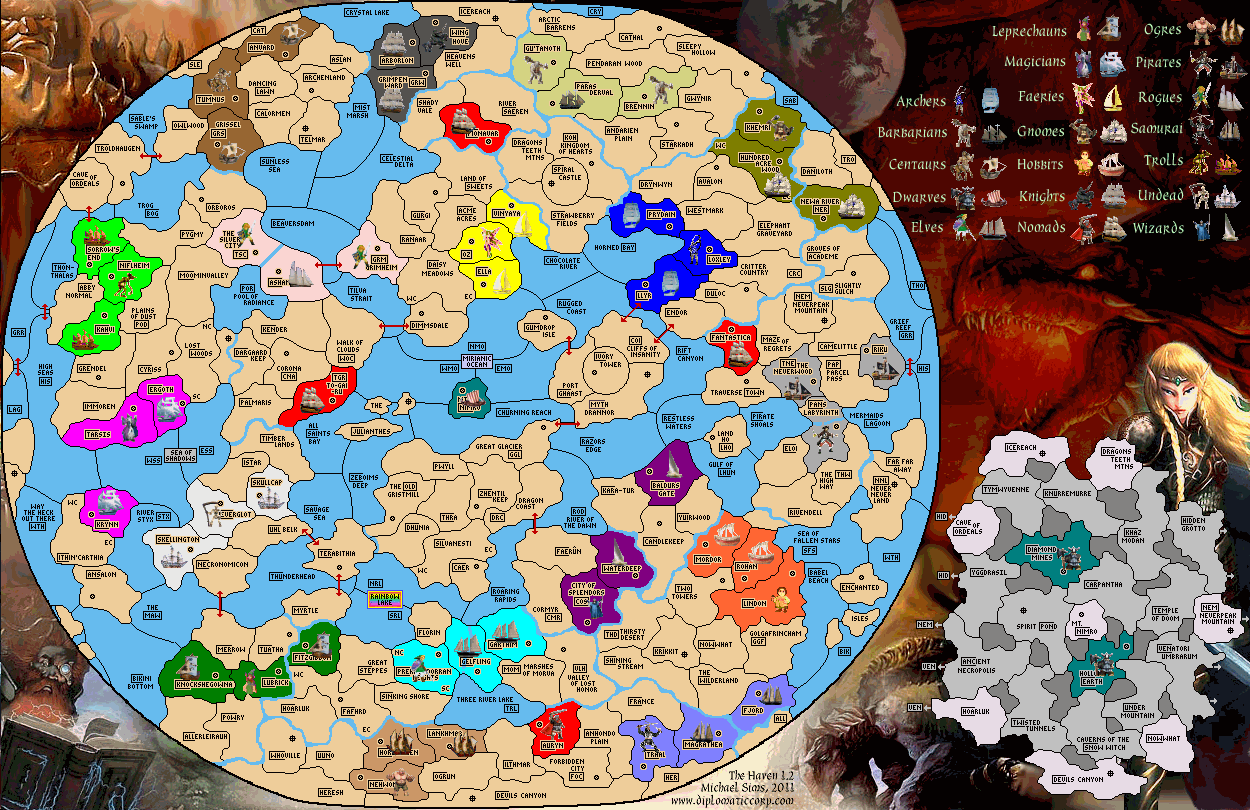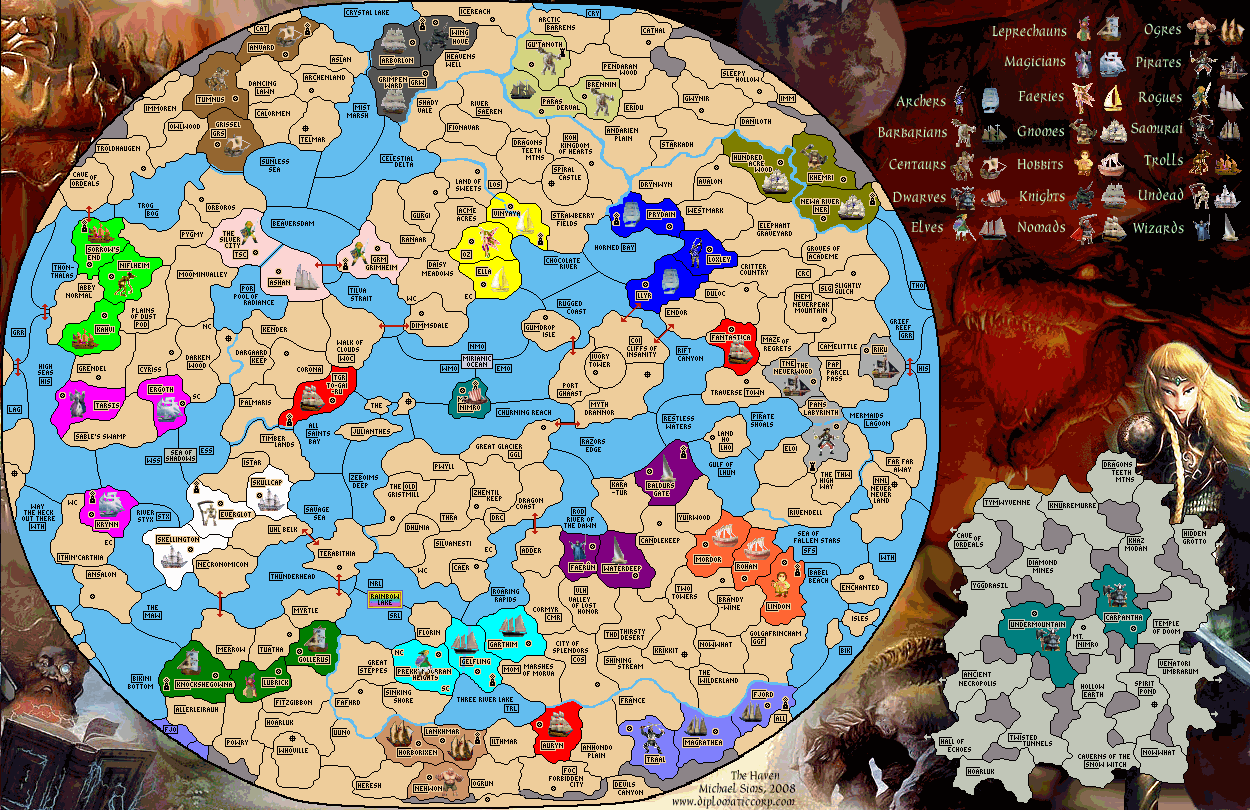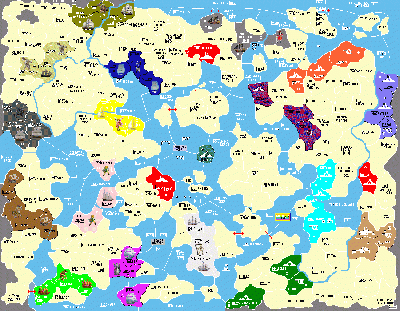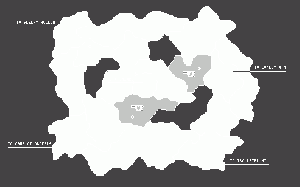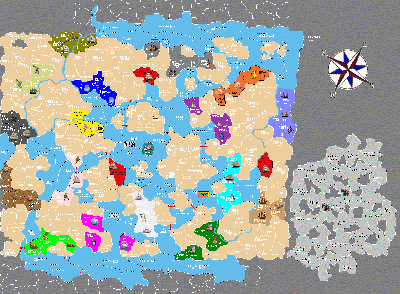Haven
by Michael Sims, 2008 Diplomaticcorp
Overview
The Haven was created to be the greatest Fog of War game of all time. It ran in the spring of 2008, in Once Within a Fog so Dreary.
The Haven was played again in 2009 in dc224 - Slaughter at Storytime. It ended in a 6-Way Draw.
The Haven was run in 2010 in dc303 - Furry Little Woodland Creatures. It ended in a 3-Way Draw.
The Haven 1.1 was played a final time late in 2010 in dc354. It ended in a 4-Way Draw. After this 4th play, some changes were considered that led to the map as it exists today...
The Haven 1.2:
Civilizations
There are 19 civilizations in The Haven. They are:
- Archers (blue)
- Barbarians (ivory)
- Centaurs (brown)
- Dwarves (teal)
- Elves (cyan)
- Faeries (yellow)
- Gnomes (olive)
- Hobbits (orange)
- Knights (black)
- Leprechauns (forest)
- Magicians (magenta)
- Nomads (red)
- Ogres (tan)
- Pirates (gray)
- Rogues (pink)
- Samurai (navy)
- Trolls (green)
- Undead (white)
- Wizards (purple)
Victory Conditions
There are 102 supply centers:
- 58 Starting home centers
- 44 Neutral centers (32 Regular, 12 Eternal Build)
52 centers are required for a solo victory.
In addition to the 102 supply centers, there are...
- 89 Clear land provinces
- 42 Sea zones
Map Features
As typically happens in games like World War IV, it is usually very difficult to obtain a victory with a majority of supply centers. As nations grow large, it becomes tougher and tougher to keep expanding, and too easy to force a stalemate. The Haven map was designed to change all that, by circumventing normal stalemate lines:
East-West Wrap
The Haven map is a sphere, and so it wraps around from side to side. Several spaces are drawn on both sides of the map purely to make the adjacencies more apparent. A unit will only be shown in one of the two sides so be aware the unit also exists on the other side. See for example The High Seas, which exists as a space toward the left edge of the map, but is drawn for reference on the right side as well.
The Underworld
The Haven is played both above and below ground. The underground passages are connected to the overworld at 8 points. These crossover spaces are:
- Mount Nimro (center)
- Neverpeak Mountain (center)
- Cave of Ordeals (northwest)
- Icereach (north pole)
- Dragons Teeth Mountains (northeast)
- Hoarluk (southwest)
- Devils Canyon (south pole)
- Nowwhat (southeast)
A unit in a crossover space exists on both maps, even tho it will only show in the overworld portion. A crossover space is connected (via land, for army movement only) to all spaces adjacent to it in both worlds. For example, an army in Yggdrasil (underground) could support a fleet moving from Thon Tholas (overworld) to Cave of Ordeals (both worlds). But once the fleet occupied the Cave of Ordeals, it could not move into either underground space - only an army could do that.
The Eternal Build Centers
There are 12 special centers on the board, designed to create hot spots and extremely desireable centers to capture. This is because any power may build in one of the 12 eternal build centers! There is no delay in the holding of such a center before it is buildable. If you capture one, you may build there as soon as it becomes vacant in a winter turn. The 9 eternal build centers are:
- Telmar (northwest)
- Icereach (north pole)
- Spiral Castle (northeast)
- Dargaard Keep (west)
- Neverpeak Mountain (central / east)
- The Julianthes (central / island)
- Myth Drannor (central / island)
- Never Never Land (central / east)
- Whoville (southwest)
- Devils Canyon (south pole)
- Krikkit (southeast)
- Spirit Pond (underworld)
The Rivers
Rivers are marked by blue lines on the map, and function like the standard game canals in Constantinople and Kiel. A fleet may move into a space that contains or is along a river, and may cross thru that space provided it moves to an adjacent space also connected to the river.
Land spaces adjacent to rivers are considered coastal. That is, fleets may move there, but a fleet on such a space cannot order a convoy. Only a fleet in a sea zone (blue) may order a convoy.
Province Names
The names are taken from over 75 fantasy books, movies, shows, games, songs, places, mythologies, fairytales, folklore, and a few of them completely made up. The more you can relate to, the more you were probly a fantasy geek growing up!
**** All the rules below this point do not apply to games currently in play.****
Fog of War Rules
There are some additional rules that apply when the game is played in the Fog of War
Lighthouses & Watchtowers
Lighthouses and Watchtowers are functionally equivalent - Lighthouses are shown on the map where they are adjacnet to water, and watchtowers are drawn where inland. Either facility watches over the two spaces adjacent to it, and keeps them lit up on every map you receive. This makes it harder to sneak up on these key cities.
If your lighthouse or watchtower is captured, it does NOT operate for enemy occupiers but will stop working for you. If you liberate the city, it would resume operation.
Special Abilities
Each Civilization has one special ability that it can use throughout the course of the game. The special abilities are:
- Archers
Archers may attack any space from a distance. An archer would order "Archer [source] range attacks [destination]. The order is treated like a normal move order, except the archer does not actually move into the space after completion. This power may be used to attack fleets at sea: Archers on a coast may support adjacent fleets (or fleet moves) at sea. Archers on a coast may also attack a neighboring sea space (as if they could move there) -- if they succeed in dislodging the defender, it must retreat like normal, even tho the archer does not move into the space. Range attacks may be supported like normal by other units.
- Barbarians
Barbarians can sense when an enemy army is approaching! Maybe it's a twich in their ear, or a scent carried on the breeze… but any time an enemy army approaches within two spaces of a Barbarian, the player is told that they sense the [number of] units to the [direction]. The specific civilization and province are not revealed.
- Centaurs
The Centaurs control an owl. The owl can move one space at a time over water or land. The owl sees two spaces every turn - the space it's moving from, and the space it's moving to. Only VISION is returned, no orders. The owl must remain within 3 spaces of any centaur to relay this information. If an owl strays too far, it will get lost. If the owl gets lost, one centaur may then train a new owl, however training a new owl takes 1 unattacked turn. Owls may only be trained by centaur armies.
- Dwarves
Dwarves may convert their fleets to armies or armies to fleets at any time (in coastal provinces only). Converting takes 1 turn, and any attack on a converting unit will cause the conversion to fail.
- Elves
Any elf that Holds - and is approached by an enemy unit - will be concealed within the trees until such time as the enemy unit attempts to move into the elven province, or the elf moves or gives support. Any order other than holding will reveal its position.
- Faeries
Faeries can fly. Any fairy that takes flight over water must return to land within two turns or it automatically disbands. Faeries may not attack over water -- any attempt to move into an occupied or challenged space fails irrelevent of supports given. Faeries may retreat to vacant sea spaces. Faeries over water may not issue support orders. A fairy move from water back to land may be supported.
- Gnomes
The ultimate makers of mischief and mayhem, Gnomes can choose to set booby traps! Setting a trap takes one unattacked turn. Three types may be set: 1) Alert: If any enemy power enters a province with an alert trap, all players within 3 spaces will hear that a [specific unit] was caught in a trap to the [direction]! 2) Snare: If any enemy unit enters a province with a snare, the unit will be rendered immobile for 1 turn! (immobile units may be supported in place). 3) Distraction: This trap does nothing until an enemy unit in a province gives a support order. When this occurs, an explosive surprise causes the support to fail. Once any trap is set off, the space is clear of traps. A max of one trap may be set per province. The Gnome player may not know one of his traps has been set off if he is not around to see it, or close enough to hear an alert.
- Hobbits
Hearty and resourceful, Hobbits will make the most of the bad times. Any time one of the Hobbit home centers is in enemy hands, the Hobbits can maintain one more unit than they have supply for. If the Hobbits are reduced to 0 SC, their bonus unit will survive for one extra year, and then be eliminated like any other power.
- Knights
Knights may charge forward 2 spaces (from A, thru B, to C). The intermediate space must be vacant at the start of the turn. The player must be able to see where he's charging into - one cannot charge thru a province into the fog. If a knight fails to move thru the intermediate space then the destination space is unaffected. A knight will move half-way and stop in the intermediate space if bounced from the final space. Supports may be ordered for the destination move (Army nearby supports Knight A to C -- the route (B) need not be specified in the support). Any activity in the intermediate space will cause the charge to be abandoned, and the move treated like an unsupported move from A to B.
- Leprechauns
Somewhere... Over the Rainbow, you never know what you'll find! Perhaps a pot of gold, or maybe a band of ogres -- but the leprechauns can choose to find out! In the Spring, one Leprechaun may choose to order over the rainbow. If he does, the GM will randomly select one of the 95 clear spaces on the map. Only vacant spaces, after all conflict is resolved will be considered... and the leprechaun instantly moves there at the end of the spring turn. The leprechaun is considered moved out of the space he originated in, for purposes of considering other moves into that space. The rainbow moves are only available to Leprechauns that are within 3 spaces of a home SC. (rainbows dont just pop up in the murky lands surrounding!) Once a rainbow move has been done, rainbows will not be available for the next two springs, limiting this move to once every 3 years.
- Magicians
The Magicians may peer into their crystal ball once per turn to reveal the contents of any one space on the map. The space must have previously been observed by the owning player -- or at most 1 space into unexplored fog (i.e. Crystal ball peer into the space [direction] of [province]).
- Nomads
The ultimate travelers that call no one place home, Nomads may build in any open (and originally neutral) supply center that they control.
- Ogres
An Ogre may order to Roar! If it does, it will distract all enemies in adjacent provinces - cutting all supports, except supports for an attack on itself. The support cuts are treated as if the Ogre had ordered an unsupported move into all adjacent spaces. A roaring ogre may be supported in place by another Ogre.
- Pirates
When ordering a fleet build, Pirates may build on any of their home centers, or in any sea zone (sea only, not coastal) in which any fleet was disbanded. Once a fleet is "rebuilt" the same one may not be rebuilt again, even if it gets disbanded again. Spaces must be vacant.
- Rogues
A rogue may disguise itself as any other army unit that the owning player has personally observed. To disguise requires a turn in which the rogue does nothing but hold and don its disguise. If attacked, the disguise order fails. Once changed, it will remain as the other unit until it changes to something else. Any disguised rogue that is dislodged for any reason instantly loses its disguise. Only one rogue may be disguised at any one time. Orders reported to anyone who sees a disguised unit move will see them as if they are the disguised civilization.
- Samurai
Samurai armies may conduct a Bonsai suicide attack. A Bonsai attack has a strength of 2 (as if it has an uncuttable support) and is lethal. If a samurai succeeds in dislodging the enemy, the target unit is disbanded, NRP. The attack must be declared with one's orders. Bonsai attacks may only be supported by other samurai - supports from other civilizations are not counted. Bonsai attacks may not be conducted on enemy units in their own home supply centers. After completion of the attack (either success or failure) the Bonsai warrior is automatically disbanded!
- Trolls
Any time a Troll is disbanded, as soon as the space that it was disbanded in becomes vacant, if there is sufficient supply, the Troll may return to life. If there is insufficient supply, the Troll will remain dead in the spot until such time as there is sufficient supply on a winter turn, at which time the Troll player may choose to let the Troll regenerate or build at home. If he opts to leave a Troll dead, it can not then choose to regenerate later. You either regenerate it at the first available time, or it withers away. If a dead troll remains dead for 2 years (4 seasons) either via choice not to regenerate, or due to the space being occupied for so long, then it will be dead forever. Any regenerated Troll is weaker than a regular Troll - it will automatically disband if dislodged, and cannot regenerate again. Any players who are in a space with a dead troll will be told there is a dead troll there, but no further explanation.
- Undead
The Undead leader may order a skeleton (army) build in any of his home centers, or may attempt to raise any disbanded enemy army on the map. It is up to the undead leader to figure out where units on the board have been disbanded, to know what dead-raising options he has. He may not raise his own skeleton dead armies, only enemy armies that were once alive and have been disbanded. Raised armies are weaker than regular armies - if they are ever dislodged, they disband, NRP and cannot be re-raised.
- Wizards
The wizard player may listen into any one space on the map and learn all orders that affect that space. The space must have previously been observed by the owning player -- not via guess or intelligence.
Realworld
Realworld adjudicator files for The Haven can be found in the Variant Library.
Older Versions
Haven 1.1 - played in dc224, dc303, and dc354.
The Making of The Haven
I love creating and playing Diplomacy variants, and have focused my development on fantasy worlds. A gamer at heart, I grew up playing the likes of Dungeons & Dragons, Battletech, Civilization, Axis and Allies, and The Legend of Zelda. All of these themes, and more, come out in the variants I've created.
This particular map was to be an improvement over my Pleasantview map, a 10-player fantasy-world Diplomacy game. Recently inspired by playing in Stefan Krekeler's World_War_IV variant, I wanted to extend my mapmaking to a larger scenario - while addressing some of the pitfalls that I felt came from such large maps.
I found 4 main drawbacks that arose out of playing a large world:
- The supply lines tended to get quite long, making for a game that bogs down toward the middle of the game. It becomes increasingly difficult to move around the world as players amass armies of 15-20 units and stalemates develop.
- The games tend to discourage changes of allegiance, i.e. stabs. Because so much time must go into moving units into position, the fluidity of the game is reduced and players tend to stick to long drawn out alliances.
- Altering the course of the game once a particular mechanic has set in motion is difficult. A draw that sets up with large powers is unlikely to result in anything other than a draw, and a solo-run that gets momentum is difficult to stop. Both are due to the problem of being unable to move units around the map freely when such vast distances must be crossed.
- Some players will never bother to write other players who start on distant continents. Because of this, some large variants, like World War IV tend to be an agglomeration of multiple smaller games put together. That is, the players in Africa will resolve their local theater first, dealing with only the local powers and perhaps the powers directly across a sea, but hardly talk to players in North America or East Asia at all. There is just no interaction. Then as the players dwindle, the game moves to a later stage where those who have survived the local fallouts have reason to interact.
So from it's earliest stage of development, I set out to create a large game that would be fluid. The initial map (seen at right) was rectangular with closed edges. Key to this initial design tho, was two new concepts: The Eternal Build centers, and the Underworld.
- The Eternal Build centers (8 of them) were on the initial draft of the map, albeit in slightly different locations. These special centers could be built in by any power. Not to be confused with Chaos Builds, the Eternal Build centers are very powerful and are coveted by every civilization for that lucrative ability to build at a forward point. This draws players into conflict over these centers where players might otherwise be content to demilitarize. How can you allow somoene to own a center, after all, if it allows them to bulid right in your back yard?
- The Underworld (very early rendition, left) was created for a mechanism by which units could quickly cross the entire world. You could enter the caves at one corner, and within 3-4 spaces, exit the caves on a completely different continent. This 3-dimensional aspect to the game was first tested with the bridge concept in Pleasantview and was expanded to a separate map off to the right of the primary map for The Haven. The Underworld was later enhanced by making it the Dwarf starting location, with access to the Mirianic Ocean, and of course - an Eternal Build center making so that anyone who controls the Underworld will have influence all over the map.
Also key in the initial design was the placement of the Nomad civilization. In concept they are the scattered warriors that exist in small tribes, but in game play they fill a very key role - that is, a single player that ties together all the 3 major continents. No longer can you diplome with only the powers local to you, for the results on another continent may result in changes to your own. Akin to Germany in a standard game, a Nomad player must interact with nearly every civilization on the map in order to survive. But done well, can lead to control in many theaters.
At this early stage of the design, many of my large-variant concerns had been addressed, but still there was the problem that nations in the middle had very little chance compared to nations that started along the edges. Thus I started looking at early ways to wrap the world. I decided to wrap the world somewhat diagonal due to how the oceans had been laid out, and eventually tipped the map by about 50 degrees and redrew everything to get to the map as we have it today. For finishing touches, I created a fresh icon set using images from my favorite stories and games, and wrapped the world with some imagery to enhance the fantasy feel to the game.
I hope you have as much fun playing it as I did designing it, and if this map ever gets played outside of Diplomaticcorp, please let me know how it goes! Feel free to add any comments to this page.
Change Log for Haven 1.2
by Michael Sims August 16, 2011
I don't take changing variants lightly or after only a playtest or two, since you don't get enough of a feel for the map to draw definite conclusions about the map itself. It is tough to discern what happened in a game of Diplomacy due to the players vs because of a map feature. After four playings tho, the time has come to make a few tweaks.
What to change? I didn't want to change things just for the sake of change. The variant is fun, people seem to love playing it (thank you!) and it's even been copied to other sites... of course the ultimate compliment. But I think it needs a few things.
What I changed, was...
- Nomads start on 4 centers and units. One common request I got is that the Nomads were just too weak. They start split up across the map with little hope of uniting their empire. Now the Nomads get a 4th life, perhaps a center to trade away in one region for help in another.
- Land of Sweets is no longer a supply center - it is moved to Fionavar, and belongs to the Nomads. The Faeries were a bit too strong, starting with an average of 2.5 builds (2/2/3/3) in the first 4 games. Now they may start +2, but finding that next dot will be a challenge.
- Northeast Corner revisited. All those dark gray non-playable barriers in the Haven 1 map made it difficult for powers to cross from one side of the board to the other. The changes around Sleepy Hollow tear down some walls, and give particularly the Barbarians a few more opening options.
- More Eternal Build Centers! Another one of the most requested enhancements. Players love getting a forward build point, and now there's 33% more of them to choose from. Icereach (North Pole), Devils Canyon (South Pole) and Neverpeak Mountain (East) are all EBCs.
- Fewer stalemate lines at the poles. We have seen many alliances develop around the poles and work from there. I don't know if this is psychological or a real edge, since you can turn the globe any way you want and have a new pole. Still it seemed to create some continental divides, so now the North and South Poles have a direct connection to the Underworld. Maintaining a continental stalemate will now require an additional two units to block the extra Underworld passage.
- Rivers, rivers rivers. Come on we all love them. They bring life, happiness, and... fleets! We were still seeing breakdowns at being able to cross from one continent to another - players either get too many fleets then can't invade, or get too many armies and get landlocked. Now you should be able to use fleets more effectively on land, as the rivers twist and turn thru the larger land masses.
- Several of the EBCs now border Rivers - making them even more valueable. Icereach, Neverpeak Mountain, and Whoville are all capable of producing fleets.
- Southern continent overhaul. That area looked ugly in Haven 1 and was admitted one of the last regions I had drawn... It had too much white space, and that made it too convenient for southern powers to arrange DMZs. Now players are drawn into heated conflict right from the start with the EBCs being reachable in the first turn. Additional rivers here make moving around the southern continent a breeze.
- Smaller map. 5 spaces were removed: Gollerus (by the Leprechauns), Adder (Wizards), Brandywine (Hobbits), Eridu (Barbarians) and Hall of Echoes (Underworld) are completely gone, taking this variant from 238 to 233 zones.
- Domino effect... The domino effect was carefully considered here. i.e. in slightly moving one center, like the Wizard starting home center from Faerun to the City of Splendors, puts them slightly further from the center of the map, which will have repurcussions of a slightly stronger Dwarf and Nomad - altering their opening moves, which then affects the Archers and Pirates, and so on.
Hopefully those effects created by these changes produce a more fluid game where each power has a good chance of winning, and multiple paths to go about doing so. Comments welcome!
